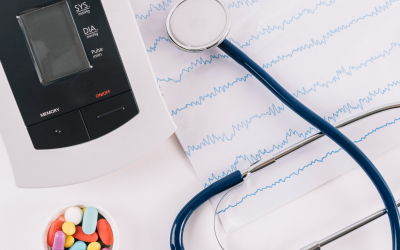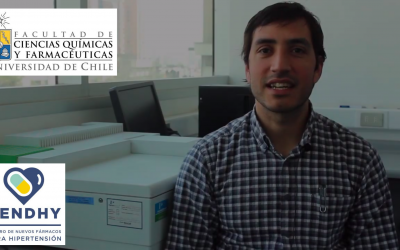On Tuesday, July 14th, Dr. Javier Morales Montecinos, director of CENDHY, participated in the program “The future is today” on Meridional Radio 100.9 FM .
At 5:30 p.m. in Magallanes (4:30 p.m. in other regions) we connected to listen to the radio program “The future is today” dedicated to science, technology and health, led by journalists María Pastora Sandoval and Paola Patiño . Just after the first block, in which the communicators spoke with the Vice Chancellor for Research and Postgraduate Studies at the University of Magallanes, Andrés Mansilla, about the Cabo de Hornos Sub-Antarctic Center, the interview with the director of CENDHY began.
More than 2,100 km away, from the city of Santiago, Dr. Morales gave details of the scientific project on which the “Center of New Drugs for Hypertension” (CENDHY) is established and on the progress since the project was awarded in December 2019 and, finally, on the objectives that we hope to achieve in these 3 years.
As María Pastora Sandoval mentioned at the beginning of the program, advances in research in science, technology and health, although they may seem difficult to understand, are crucial for people’s lives. In the case of our country, about 27% of the population has high blood pressure, a proportion very similar to the world average. Furthermore, as a result of the COVID-19 pandemic and according to data from the Epidemiology Department of the Ministry of Health, of the total number of hospitalized patients positive for coronavirus, a more or less stable percentage of 30% has hypertension as a base condition.
High blood pressure does not exclusively affect older adults, as Paola Patiño said during the program, but can also be diagnosed in young adults. Particularly in our country where the figures for overweight, obesity, sedentary lifestyle and smoking are quite high, the risk and prevalence of high blood pressure are projected to continue to increase in the coming years.
Our director, academic from the University of Chile and associate researcher at the Advanced Center for Chronic Diseases (ACCDiS), Dr. Javier Morales, referred to the central objective of the project, which is “to improve or generate new types of medications that allow for better treatment. hypertension, which is a global problem”. Adding that “the problem of hypertension is not only this increase in blood pressure, for which there is already pharmacology that allows controlling it, but also involves other complications”, referring to damage to secondary organs such as to the lungs and kidneys, and not just to the heart and blood vessels as one might suppose.
The pharmacology that currently exists for the treatment of hypertension is not capable of reversing this additional damage caused by pathology and, on the other hand, the professor of the Faculty of Chemical and Pharmaceutical Sciences states that “current therapies have problems of adherence, that is to say, patients who know that they have to take their medications sometimes forget it or are not rigorous, and all of this has repercussions on the progression of the disease and the condition is becoming more complicated”. Considering this set of very diverse barriers to the treatment of hypertension, and having the expertise of a multidisciplinary team of researchers from the University of Chile, Pontificia Universidad Católica de Chile and Universidad Andrés Bello , Dr. Morales told in the interview about the identification of a type of molecules that could be useful in the treatment of hypertension: “our collaborators from the Catholic University have found some peptides that are potential drugs, not only to reduce blood pressure, but also to improve these additional complications that I mentioned”. Regarding the projections of the finding, the academic commented that “is a possible super powerful therapy in improving the standard of living and the progression of the disease of hypertensive patients”.
Our director was clear in pointing out the limitations of the use of these peptides as medicine, explaining that “in simple terms, it is practically impossible to put these molecules in a pill, like the conventional ones that you take with water”, to then refer to the contribution from the scientific team of the University of Chile and the technological proposals they have developed to overcome these barriers. “All these proposals, the peptides and the technology, allow us to increase the time that the molecule is in the body and therefore it has more time to exert its effect, and on the other hand to develop administration forms that are more friendly for the patients”, noted Dr. Morales.
Regarding drug delivery technologies, the researcher alluded to his joint work with academics from the Faculty of Chemical and Pharmaceutical Sciences of the University of Chile in developing a methodology for oral drug delivery through polymeric films, clarifying that “are sheets that one would place inside the mouth, adhere to the cheek and the drug is absorbed through the epithelium and is quickly disposed of throughout the body, so it constitutes a pharmaceutical form that makes it easy for the patient to administer”.
When asked about the project deadlines and when the results could be made available to hypertensive patients, the professor clarified that “this research project funded by the National Agency for Research and Development (ANID) aims to carry out a validation robust in the preclinical phase, which is the stage just before the most promising candidates can enter clinical phases, which are human trials”. Evidently, as a result of the pandemic, as Dr. Javier Morales Montecinos mentions, most of our researchers, researchers, international collaborations and laboratories in the three universities are paralyzed, and we hope to resume our work safely when possible.
“The idea -concludes the director of CENDHY- is to combine this knowledge of the multidisciplinary team to develop a more efficient pharmacology”.
Watch the interview again on our YouTube channel: https://youtu.be/LWjPbxPXndk





0 Comments